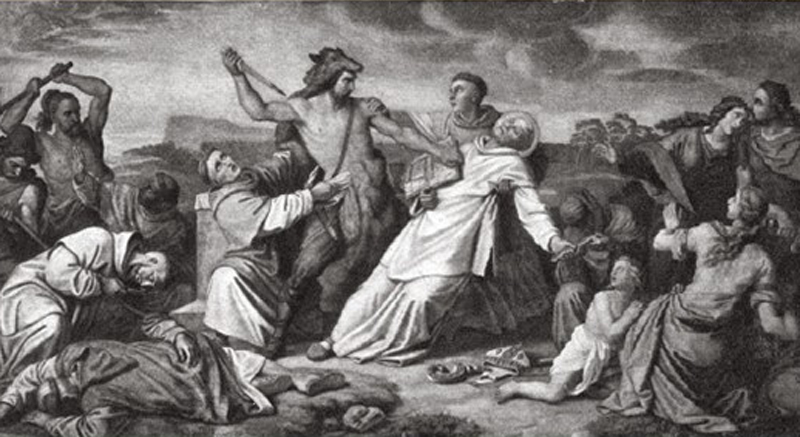(Died 755 AD)
St. Boniface was a native of England. He was baptized under the name of Winfrid but received the name Boniface from the Pope, on account of the great good which he did. Boniface means one who does good.
When just 5 years old, he requested of his parents to be sent to a monastery to be instructed by the monks as well in religion as in other sciences. His father opposed this wish but falling sick and believing it a punishment sent by God, he gave his consent and recovered immediately.
Boniface eventually took the habit of the religious of St. Benedict. His esteem by the brethren of this order, may be seen from the fact that in the course of a few years, they unanimously elected him successor of their late Abbot. He refused to accept the honor, and made known his desire to preach the Gospel to the heathens. He succeeded so well in representing everything connected with his plan, that the monks not only abstained from further efforts to persuade him to yield, but gave him permission, with several others whose hearts were filled with the same desire, to go to Rome and offer himself to the Pope for so holy a work.
Gregory II, at that time pope, rejoiced when Boniface informed him of his intention, and after having had several conversations with him on the subject, he gave him the powers of an Apostolic missionary, with full permission to preach the Gospel everywhere, especially in Germany. He presented him at the same time some relics and dismissed him with his pontifical blessing. Boniface, leaving Rome, went first to Bavaria, then to Thuringia, where the Christian faith was, almost extinguished but in the space of 6 months he led the Christians to a better life, and cleansed almost the whole of Thuringia from idolatry.
Upon the death of Radbod, Duke of Friesland, an archenemy of the Christian faith, Boniface determined, that circumstances had thus changed. So, he went to Friesland to convert the inhabitants. On arriving at Utrecht, he went to St. Willibrord, first bishop off the church there, and spent three years in preaching and instructing the people. His success was so great, that all the inhabitants became Christians, all the idolatrous temples were overthrown or changed into Christian churches.
After this, the indefatigable apostolic preacher went to Hesse, where in a short time he converted many thousands to the Christian faith, built many churches and supplied them with pious priests. He also built several monasteries and convents for those who desired to serve God more perfectly.
The pope was so pleased with Boniface’s many successes and desired to see Boniface himself. The saint therefore went a second time to Rome, was most kindly received by the holy Father, and consecrated bishop. It was at this time that his name Winfrid was changed into Boniface.
Thereafter the saint returned to Hesse in Germany. The story goes that he found people still intrenched in paganism. They worshiped a tree which they believed held the power of Jupiter. The holy bishop could not endure this sacrilege, and although the pagans threatened to kill him if he touched the tree, he went to the place where it stood, and seized an ax to fell it. At the first stroke, the immense tree, fell to the ground and was split into four parts. This visible miracle opened the eyes of the heathens and moved them to abandon idolatry. The bishop erected, in the place where the tree had stood, a chapel in honor of St. Peter. In Thuringia, whither he went next, he built a church in honor of the Archangel Michael on the place where the latter had appeared to him and exhorted him to continue bravely in the work that he had begun.
Boniface divided the whole country into four bishoprics: Salzburg, Friesingen, Regensburg and Passau, in order to give the newly converted better opportunities to be instructed and preserved in the faith. He later did the same at Eichstadt and Wurzburg in Franconia. He founded many convents and churches. He erected monasteries with the intention to educate men who would be able to defend the true faith, to instruct the faithful in leading a Christian life, and to bring to the true Church those who were still heathens. In addition, the Pope named Boniface the archbishop of Mentz, where he remained for seven years in continued apostolic labor for the salvation of those in his charge.
Boniface resigned as archbishop in order to return to Friesland where the people, once again, lapsed into paganism. Although he had much success, he had gained the enmity of the pagan priests who, with a mob of followers Martyred Boniface and his faithful companions.
Adapted by A.J. Valentini from: St. Boniface, Apostle of Germany. Bishop and Martyr. (n.d.). Catholic Harbor of Faith and Morals. Retrieved May 25, 2021, from http://catholicharboroffaithandmorals.com/St.%20Boniface,%20Apostle%20of%20Germany.html
